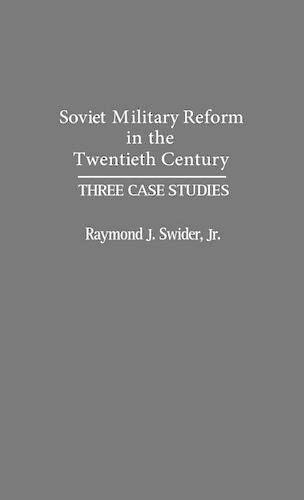
Soviet Military Reform in the Twentieth Century: Three Case Studies
(Hardback)
Publishing Details
Soviet Military Reform in the Twentieth Century: Three Case Studies
By (Author) Raymond J. Swider
Bloomsbury Publishing PLC
Praeger Publishers Inc
30th November 1992
United States
Classifications
Tertiary Education
Non Fiction
History: specific events and topics
355.00947
Physical Properties
Hardback
192
Description
This history of the major military reforms in the Soviet Union in the 20th century aims to fill a gap in scholarly studies on the subject and to provide a model for analysing past and future doctrine, force structure and technology and command and control tactics. The study aims to be a kind of benchmark for measuring and identifying reforms in three key periods. It is intended for historians and analysts in military affairs, political scientists and scholars dealing with Soviet, Russian, and new independent states in the region. This history analyses three periods of fundamental reform. The Frunze reforms of the mid 1920s laid the institutional basis for the Red Army, enabling it to develop into an integrated and professional army. The post-World War II reforms and the process of demobilisation and mobilisation permitted the USSR to remain a nation under arms without hobbling its economy. The Revolution in military affairs in the Krushchev era illustrates Soviet accommodation to technological changes in warfare. And finally, the process of reform and imperatives for reform are evident in the Gorbachev progress of perestroika and glasnost which were cut short. The case studies in the book are made against a backdrop of external and internal politics and economics. Currently, the centralised Soviet structures are disintegrating along lines by which they were developed earlier. Whatever the future, military reform and reorganisation will relate closely to past practice. There are many similarities between past and present challenges and lessons to be drawn from the past.
Reviews
"An excellent work and a tremendous reference document that any . . . military historian would find extremely interesting, timely, and useful . . . relevant to the current challenges before the Russian leadership."-Steven R. Covington, Military Studies Policy Division, SHAPE
"This is a fine work on an important subject over which there will be heated discussions for five years or more."-John Erickson, University of Edinburgh
Author Bio
RAYMOND J. SWIDER, Jr., is currently an International Technical Officer with the Federal Aviation Administration and formerly was Foreign Liaison Officer at the Headquarters of the U.S. Air Force and Research Fellow, University of Edinburgh.
